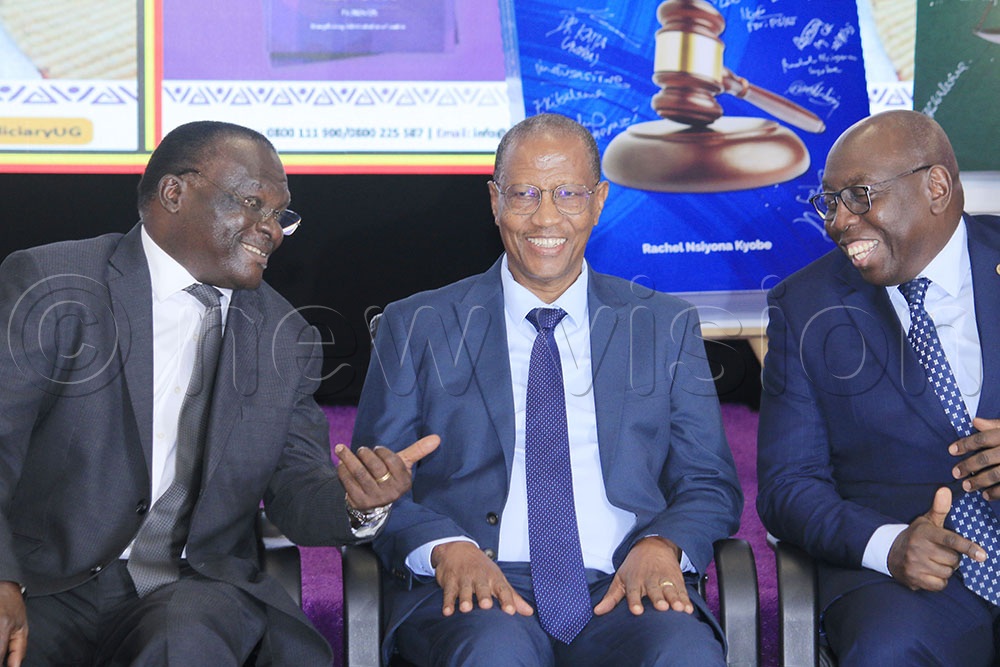Judiciary says reduced case backlog last year, launches compendium on election petitions
Owiny-Dollo commended Ekirikubinza for coming up with the compendium, saying each electoral cycle presents new dimensions in election cases.
Professor Lillian Tibatemwa-Ekirikubinza appends her signature during the judicial annual report launch held in Kampala on September 23. (Credit: Alfred Ochwo)
KAMPALA - The Judiciary has released its performance report for the last financial year, revealing a decline in case backlog.
The report indicates the Judiciary disposed of 259,331 cases of the 450,124 caseloads, representing a disposal rate of 58%.
Speaking at the launch of the report at the Judiciary headquarters in Kampala on Tuesday, September 23, 2025, Chief Justice Alfonse Owiny-Dollo said the courts closed the 2024/25 financial year with a pending caseload of 190,793 cases, of which 46,181 were categorised as backlog.
This represents a significant case backlog reduction from 26.3% in the previous financial year to 24.2%.
A case is considered a backlog if it has spent more than two years in the judicial system. The High Court has the highest case backlog at 27,232.
Criminal matters stand out
Criminal matters were the most registered and completed, according to the report. The report shows that 125,686 criminal cases were registered and 118,883 were completed.
According to the report, 24,976 cases were completed through small claims procedure mechanisms, releasing sh19.5b back to the economy, while 6,803 cases were resolved through mediation.
Cases against judicial officers
In regard to complaints against judicial officers and the court support staff, Owiny-Dollo revealed that 1,288 complaints were filed with the inspectorate of court and 1,268 have been investigated to their logical conclusion.
Without revealing their names, Owiny-Dollo said the inspectorate has recommended dismissal of the culprits.
Owiny-Dollo also revealed that Cabinet has since approved the enhancement of the pecuniary jurisdiction of chief magistrates from shillings 50 million to 100 million and that of the grade one magistrates from 20 million to 50 million, and they are only waiting for the certificate of financial implications to cause the amendment of the law.
This, he said, will help in case of backlog reduction.
Understaffing challenge
The report shows that the judiciary operates at 32% of the approved staff structure, which Owiny-Dollo said also affects its performance.
According to the report, the Judiciary registered significant growth in non-tax revenue collections, remitting a total of shillings 12.909 billion to the Consolidated Fund.
In regard to bail money, 26.12 billion is unclaimed. Owiny-Dollo urged people whose cases have been filed to reclaim their money.
Following the enactment of the Judiciary Administration Act, 2020, the judiciary must issue an annual performance report.
Acting chief registrar Pamela Lamu Ocaya noted that the Judiciary's annual performance report is a key accountability tool for the Judiciary in which it accounts to the people on whose behalf it administers justice. 
(L-R) Chief Justice Alfonso Owinyi Dolo, Deputy Chief Justice Richard Butera and Justice Geoffrey Kiryabwire interact during judicial annual report launch held in Kampala on September 23. (Credit: Alfred Ochwo)
Compendium on election petitions
At the same event, the chief justice also launched a compendium on election petitions.
Supreme Court judge Prof. Lilian Tibatemwa-Ekirikubinza underscored the importance of the compendium, saying it will enhance electoral justice in the country as it will ensure uniform decisions of the courts in handling election petitions that will arise out of the 2026 general elections.
Ekirikubinza said the compendium contains several decided cases that speak to the different principles of law concerning election petitions.
“We believe this compendium, if used by the judges, will enhance electoral justice because we shall have uniform decisions,” Ekirikubinza said.
Ekirikubinza observed that since the adoption of the 1995 Constitution, Uganda has experienced six election cycles, each with disputes stemming from failure to observe laws.
“However, we have seen some inconsistencies with the court decisions on cases with similar facts, and thus we decided to review the Court of Appeal decisions, which have a final say in parliamentary election petitions, and we have come up with this compendium, which I believe is very resourceful to both the judges and the legal practitioners,” Ekirikubinza said.
Ekirikubinza said the compendium was generated out of the decisions that were made by the Court of Appeal in the previous election petitions, and it contains dependable precedents on every aspect.
“We expect the High Court judges to make use of this compendium to ensure electoral justice,” Ekirikubinza said.
Ekirikubinza said he was motivated to come up with the compendium after positive feedback on an earlier one, which aided the judges in adjudicating the 2016 election disputes with ease.
The compendium also speaks to the contradictions in the electoral laws, such as the use of affidavits as evidence in election matters, digital service, among others.
“We have provided dependable precedents in this compendium that can be relied on by judges, and that is why this is a crucial tool for adjudicating electoral disputes,” Ekirikubinza said.
Owiny-Dollo commended Ekirikubinza for coming up with the compendium, saying each electoral cycle presents new dimensions in election cases.
“Anyone who has practised law will appreciate the importance of having decisions put in one place. We should make it a tradition because each election cycle presents new dimensions in election cases,” Ekirikubinza said.
Constitutional lawyer Peter Walubiri also commended Ekirikubinza for coming up with the compendium, saying it will enhance electoral justice in the country.
“We have had a problem of judges who may not be alive to some principles. Therefore, we thank Justice Tibatemwa for coming up with this compendium, and we believe it is going to be very crucial in resolving electoral disputes,” Walubiri said.